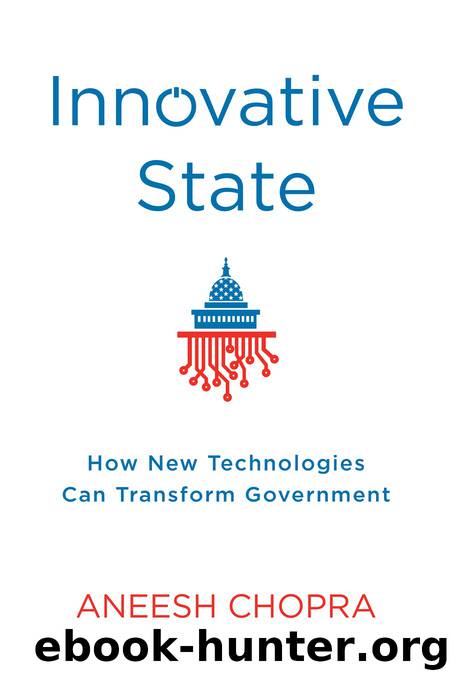Innovative State by Aneesh Chopra

Author:Aneesh Chopra [Chopra, Aneesh]
Language: eng
Format: epub
ISBN: 9780802121332
Publisher: Grove Atlantic
Published: 2014-04-03T04:00:00+00:00
Chapter 7
Prizes and Challenges
In 1861, with the Civil War starting to rage on sea as well as land, the Union found itself in very rough waters. Its strategists knew that its antiquated wooden boats were no match for the Confederacy’s more modern, sturdier ironclad ships.1 And they knew that, if they didn’t upgrade their own fleet, they were sunk. That’s why the Navy engaged in a procurement process, selecting three designs for further development, including one from John Ericsson. At the Battle of Hampton Roads in 1862, Ericsson’s USS Monitor managed an important draw against the Confederate battleship Virginia, at least temporarily preserving the Union blockade of the Commonwealth of Virginia.
Following that modest success, President Abraham Lincoln and the Navy expanded the ironclad fleet in early 1863. But with increasing use, the Navy discovered that the vessels had a key defect: the magnetism of the iron siding interfered with compass tracking, skewing navigation so significantly that even the most capable captains often steered the ships the wrong way.
Thankfully, President Lincoln had a new vehicle to help steer them back. Starting with Benjamin Franklin’s foundation of the American Philosophical Society (APS) in 1743, there had been many calls for, and attempts at, creating a national society of science, through which ready, willing, and able experts would pool their talents to tackle the nation’s most pressing and seemingly intractable problems.2 That effort gained some momentum in the 1850s, through the work of a group of influential, yet self-deprecating scientists in Cambridge, Massachusetts (calling themselves the Scientific Lazzaroni after an Italian bakery). But it was the Civil War that made such collaborative exploration really imperative, since the military began to recognize the value of scientific advice in evaluating new inventions to aid the war effort. In 1863, as he was assessing the ironclad problem, President Lincoln signed into law a unanimous act of Congress to establish the nonprofit, independent National Academy of Sciences (NAS), for work on an assortment of challenges during the conflict at hand and—assuming the Union endured—the decades to come.3
Fifty scientists signed up for the cause, receiving no compensation. A subset of them got to work on the Navy’s ironclad assignment. The results were impressive enough that President Obama spoke of them in a 2013 speech marking the 150th anniversary of the National Academy of Sciences. “By the next year, they were inspecting the Union’s ironclads and installing an array of bar magnets around the compasses to correct their navigation,” Obama told the audience. “So right off the bat, you guys were really useful. In fact, it’s fair to say we might not be here had you not. Certainly I would not be here.”
That line drew laughter, but the story of the National Academy’s founding is fodder for a serious conversation about problem solving, specifically the need for the government to be open, flexible, imaginative, and even courageous. Consider the stakes for Lincoln: he was in the midst of a conflict that could have entirely wiped out a young country.
Download
This site does not store any files on its server. We only index and link to content provided by other sites. Please contact the content providers to delete copyright contents if any and email us, we'll remove relevant links or contents immediately.
Rich Dad Poor Dad by Robert T. Kiyosaki(6632)
Bad Blood by John Carreyrou(6621)
Principles: Life and Work by Ray Dalio(6447)
Playing to Win_ How Strategy Really Works by A.G. Lafley & Roger L. Martin(6304)
Management Strategies for the Cloud Revolution: How Cloud Computing Is Transforming Business and Why You Can't Afford to Be Left Behind by Charles Babcock(4572)
The Confidence Code by Katty Kay(4260)
Thinking in Bets by Annie Duke(4227)
American Kingpin by Nick Bilton(3886)
Delivering Happiness by Tony Hsieh(3425)
Project Animal Farm: An Accidental Journey into the Secret World of Farming and the Truth About Our Food by Sonia Faruqi(3221)
The Power of Habit by Charles Duhigg(3139)
The Tyranny of Metrics by Jerry Z. Muller(3072)
The Marketing Plan Handbook: Develop Big-Picture Marketing Plans for Pennies on the Dollar by Robert W. Bly(3062)
Brotopia by Emily Chang(3054)
Mastering Bitcoin: Programming the Open Blockchain by Andreas M. Antonopoulos(3042)
I Live in the Future & Here's How It Works by Nick Bilton(2997)
The Content Trap by Bharat Anand(2925)
Building a StoryBrand by Donald Miller(2912)
Applied Empathy by Michael Ventura(2904)
